Unleash Your Potential: Practical Steps to Overcome Self-Doubt
By Remy Meraz • July 8, 2023
Key Takeaways
- Understanding the roots and consequences of self-doubt is crucial.
- Recognizing self-doubt symptoms can help address it.
- Boosting self-confidence is key to overcoming self-doubt.
- Positive self-talk, self-compassion, and supportive environments help alleviate self-doubt.
- Successful people have overcome self-doubt, providing hope and inspiration.

We've all felt it – that nagging voice in the back of our mind whispering that we're not good enough, not skilled enough, not experienced enough. It's called self-doubt, and it's an all-too-common affliction that can hinder our personal and professional growth if we let it. But let's be clear about one thing: it's not an insurmountable barrier. You have the power to overcome it.
In today's fast-paced, hyper-competitive world, self-doubt can sneak up on us and quickly cloud our thoughts, robbing us of our potential. It might convince us to stay in our comfort zones, away from the risk of failure. But what if we told you that self-doubt isn't an enemy, but rather a challenge waiting to be conquered?
At Zella Life, we believe in the power of transformation. Self-doubt can be conquered, and that journey starts with understanding its roots and identifying its presence in our lives. This blog post will serve as a comprehensive guide, providing you with practical steps to overcome self-doubt, build self-confidence, and unlock your true potential.
Ready to say goodbye to self-doubt? Let's get started.
Join our Newsletter
Transform your career with our personal growth insights. Get one valuable tip right in your inbox every Saturday morning.
Understanding the Roots of Self-Doubt
Self-doubt isn't just a product of the mind; it's often the result of external influences and deeply ingrained societal expectations. This section delves into the roots of self-doubt, offering insight into how it arises and why it's such a prevalent issue.
Psychological Reasons Behind Self-Doubt
Understanding self-doubt begins by exploring the psychological origins of this damaging mindset. Self-doubt can stem from past failures, criticism, and rejection, which shape our self-perception and create fear of similar experiences in the future. It's a defense mechanism, meant to protect us from potential pain or disappointment. However, when unchecked, it can prevent us from taking chances and pursuing opportunities that lead to growth.
The Role of Societal Expectations and Comparisons in Breeding Self-Doubt
We live in a society that often values achievement and conformity. This constant pressure to fit in and succeed can instill a sense of self-doubt, especially when we compare ourselves to others. When we perceive others as more successful or happier than we are, it fuels self-doubt, making us question our abilities and worth.
For further insights into the origins and impact of self-doubt, we recommend reading The Courage to Be Disliked. This illuminating book delves into the nature of self-doubt and provides invaluable perspectives on how to tackle it.
By understanding the roots of self-doubt, we're better equipped to address it head-on. But acknowledging its existence is just the first step. The path to overcoming self-doubt involves more than just understanding; it also requires active effort to change our mindset and behaviors. In the next sections, we'll explore practical strategies to help you do just that.
Consequences of Persistent Self-Doubt
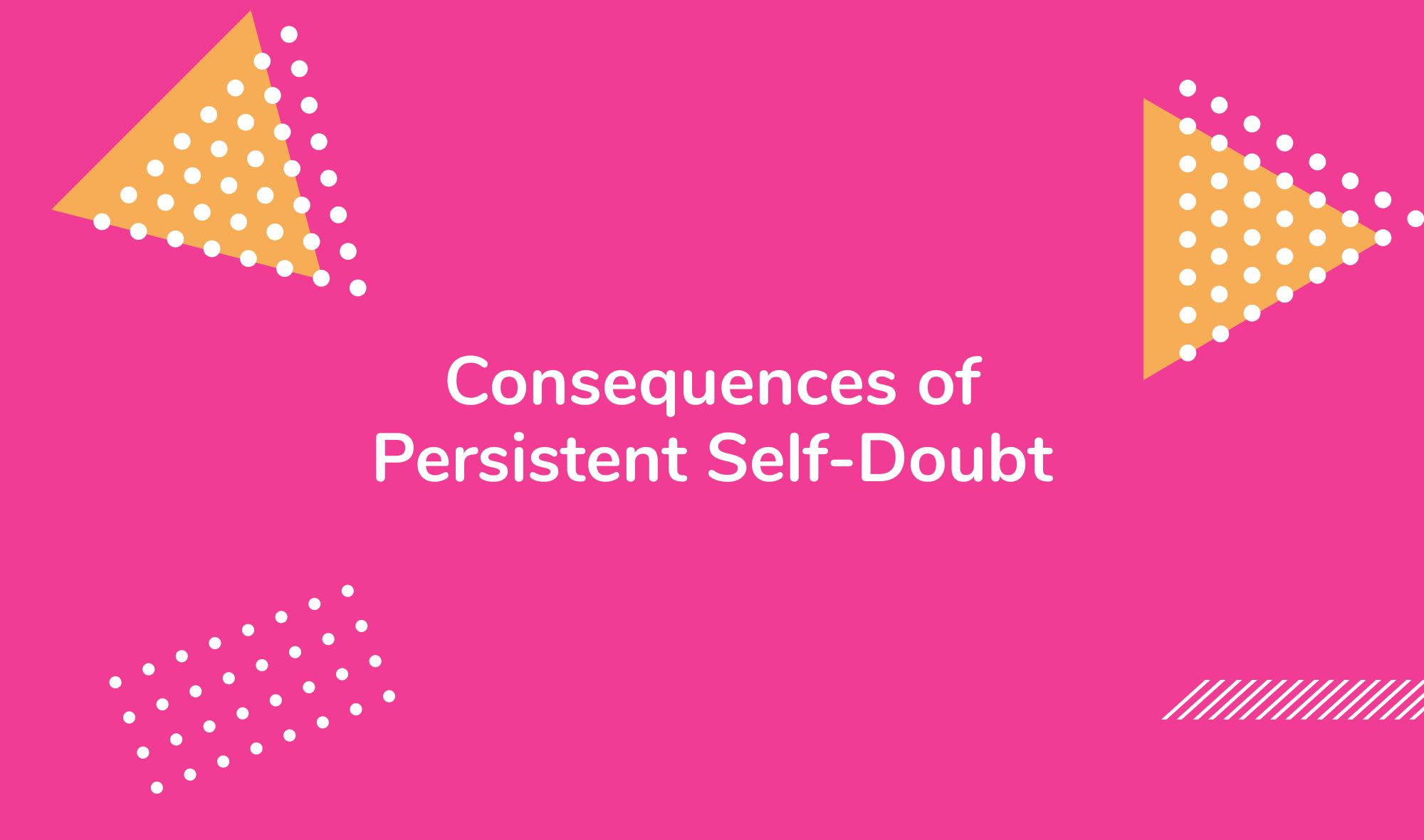
Persistent self-doubt can be more than just a hindrance; it can have severe consequences for both mental health and professional performance. Unveiling these effects is crucial to understanding the urgency of addressing and overcoming self-doubt.
Negative Effects on Mental Health
Constant self-questioning and doubt can take a significant toll on one's mental health. It can lead to increased stress, anxiety, depression, and a variety of other mental health issues. Over time, this negative self-perception can erode self-esteem and lead to a cycle of self-deprecation and self-neglect.
Impact on Performance and Success
Self-doubt doesn't just affect personal well-being; it can also influence professional and academic success. By continuously questioning our capabilities, we risk undermining our performance and inhibiting our potential for growth and success. This persistent doubt can result in procrastination, decreased productivity, and unfulfilled potential.
A prime example of how self-doubt can affect professional success is the phenomenon of Imposter Syndrome. Despite their achievements, people experiencing Imposter Syndrome often doubt their abilities and fear being exposed as a "fraud." For more information about Imposter Syndrome and its connection to self-doubt, we encourage you to read our blog post on Imposter Syndrome at Zella Life.
Acknowledging these damaging consequences is a significant step towards breaking free from the chains of self-doubt. In the following sections, we'll guide you through practical steps and strategies to begin this journey.
How to Identify Self-Doubt
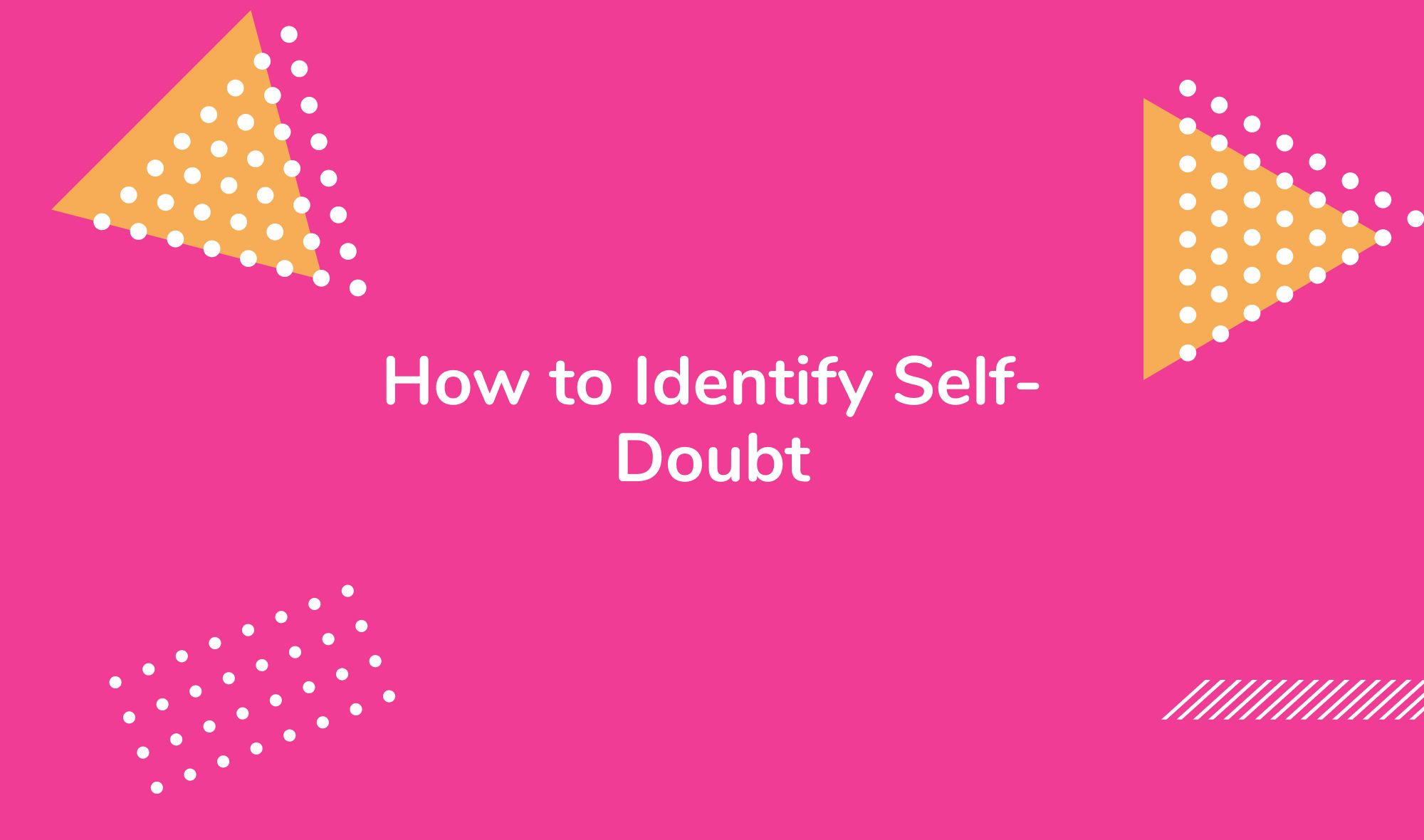
Before we start addressing the issue, we must learn to identify the signs of self-doubt. It's crucial to become aware of these symptoms to catch self-doubt in its tracks and begin the process of overcoming it.
Symptoms of Self-Doubt
Self-doubt can manifest in various ways. Here are some of the most common symptoms:
- Frequent second-guessing: You find yourself constantly questioning your decisions, even for minor issues.
- Fear of criticism: You worry excessively about what others think and fear criticism or judgment.
- Reluctance to take on new challenges: Fear of failure holds you back from stepping out of your comfort zone.
- Perfectionism: You believe that if you can't do something perfectly, it's better not to do it at all.
- Undermining your achievements: You attribute your success to luck or external factors, rather than your own skills and effort.
If you're experiencing any of these symptoms, it's likely that you're dealing with self-doubt. Recognizing these signs is the first step towards changing the narrative and fostering self-confidence.
The process of identifying these symptoms connects to a broader concept: self-awareness. Understanding oneself is fundamental to personal and professional growth, and self-awareness can be a powerful tool in battling self-doubt.
Learn more about the importance of self-awareness and how to cultivate it in our blog post on Self-Awareness on Zella Life. Be sure to also explore our best leadership coaching quotes and their hidden messages for further inspiration and guidance.
Overcoming Self-Doubt: Building Self-Confidence

After understanding the roots and consequences of self-doubt, and learning how to identify it, the next stage is learning to overcome it. The key lies in building self-confidence. This can be a challenge, but with patience and practice, anyone can replace self-doubt with self-confidence.
Steps to Improve Self-Confidence
- Reframe Negative Thoughts: Acknowledge your negative thoughts, and try to challenge and change them. Instead of focusing on your failures or flaws, focus on your successes and strengths.
- Set Small, Achievable Goals: These provide opportunities for success, which can boost your self-confidence over time.
- Practice Positive Affirmations: Positive affirmations can help reprogram your mindset. Repeat positive statements about yourself daily.
- Face Your Fears: Stepping outside of your comfort zone and facing your fears can greatly enhance your self-confidence.
- Practice Self-Compassion: Be kind to yourself when you make mistakes. Understand that everyone is human and errors are part of growth.
For more tips on how to overcome self doubt and build self esteem, check out Boost Your Mental Health: How to Build Self Esteem.
Join our Newsletter
Transform your career with our personal growth insights. Get one valuable tip right in your inbox every Saturday morning.
The Role of Self-Efficacy and Self-Belief in Overcoming Self-Doubt
Belief in one's ability to succeed in specific situations, known as self-efficacy, plays a vital role in how you approach challenges, tasks, and goals. Likewise, self-belief allows you to trust in your abilities and have faith in your potential. Building these attributes can be a game-changer in overcoming self-doubt.
If you are interested in a comprehensive guide on how to bridge the gap between self-doubt and self-confidence, we recommend Russ Harris's book, "The Confidence Gap: A Guide to Overcoming Self-Doubt".
Achieving a balance between professional and personal development is essential in your journey of overcoming self-doubt and building self-confidence. Discover more about the importance of both, and how they interact in our blog post on Professional vs Personal Development at Zella Life.
Stay tuned for the next section, where we will explore the power of positive self-talk and practice self-compassion in conquering self-doubt.
Harnessing the Power of Positive Self-Talk
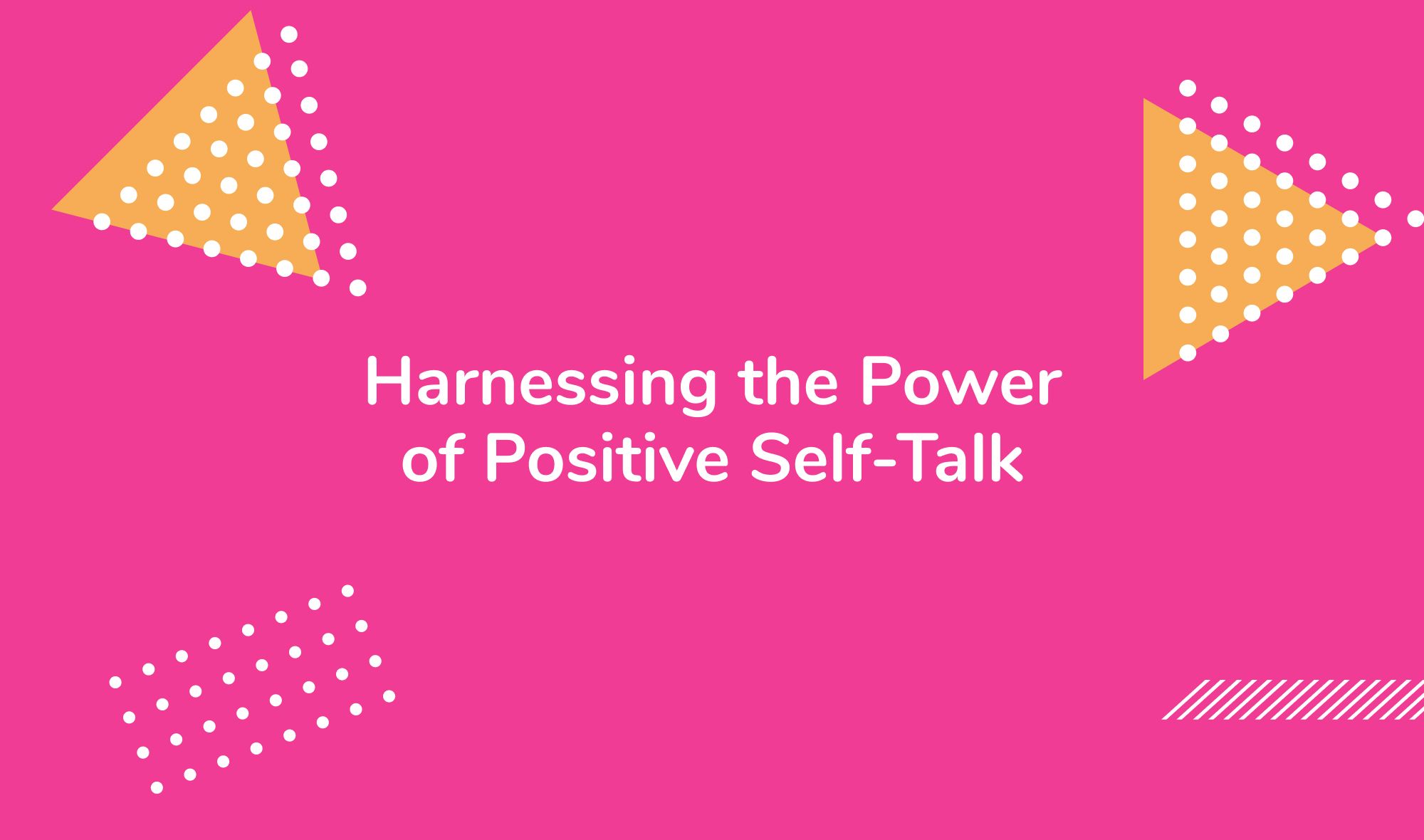
An important part of overcoming self-doubt and enhancing self-confidence lies in the words we tell ourselves every day. Harnessing the power of positive self-talk can significantly impact your self-perception and, ultimately, your actions.
How Positive Self-Talk Helps Stop Doubting Yourself
Positive self-talk is not about deceiving yourself with unfounded optimism. Instead, it's about countering self-defeating beliefs and fueling your endeavors with positive energy. Positive self-talk acts as a form of self-support, like having your own personal cheerleader in your mind. It can change your internal narrative from "I can't" to "I can," thereby diminishing self-doubt and fostering self-confidence.
Techniques to Adopt Positive Self-Talk
- Identify Negative Self-Talk: The first step to adopting positive self-talk is recognizing when you're engaging in negative self-talk.
- Challenge Negative Thoughts: Once you identify a negative thought, challenge it. Ask yourself if it's based on fact or assumption.
- Replace Negative Thoughts with Positive Ones: Over time, replace negative thoughts with positive affirmations.
- Use Positive Affirmations: These are simple statements that you can use to encourage and motivate yourself. They should be in the present tense and speak to your abilities and goals.
- Practice Mindfulness: Being present and mindful can help you stay focused on positive thoughts instead of dwelling on past failures or future anxieties.
Nurturing your mind is just as important as taking care of your physical health. In our blog post on Mental Fitness: Strategies and Benefits, we at Zella Life provide further insight on maintaining mental wellness, including adopting positive self-talk.
The final part of our series on overcoming self-doubt focuses on transforming self-sabotaging behaviors, which we will delve into next.
Practicing Self-Compassion to Alleviate Self-Doubt
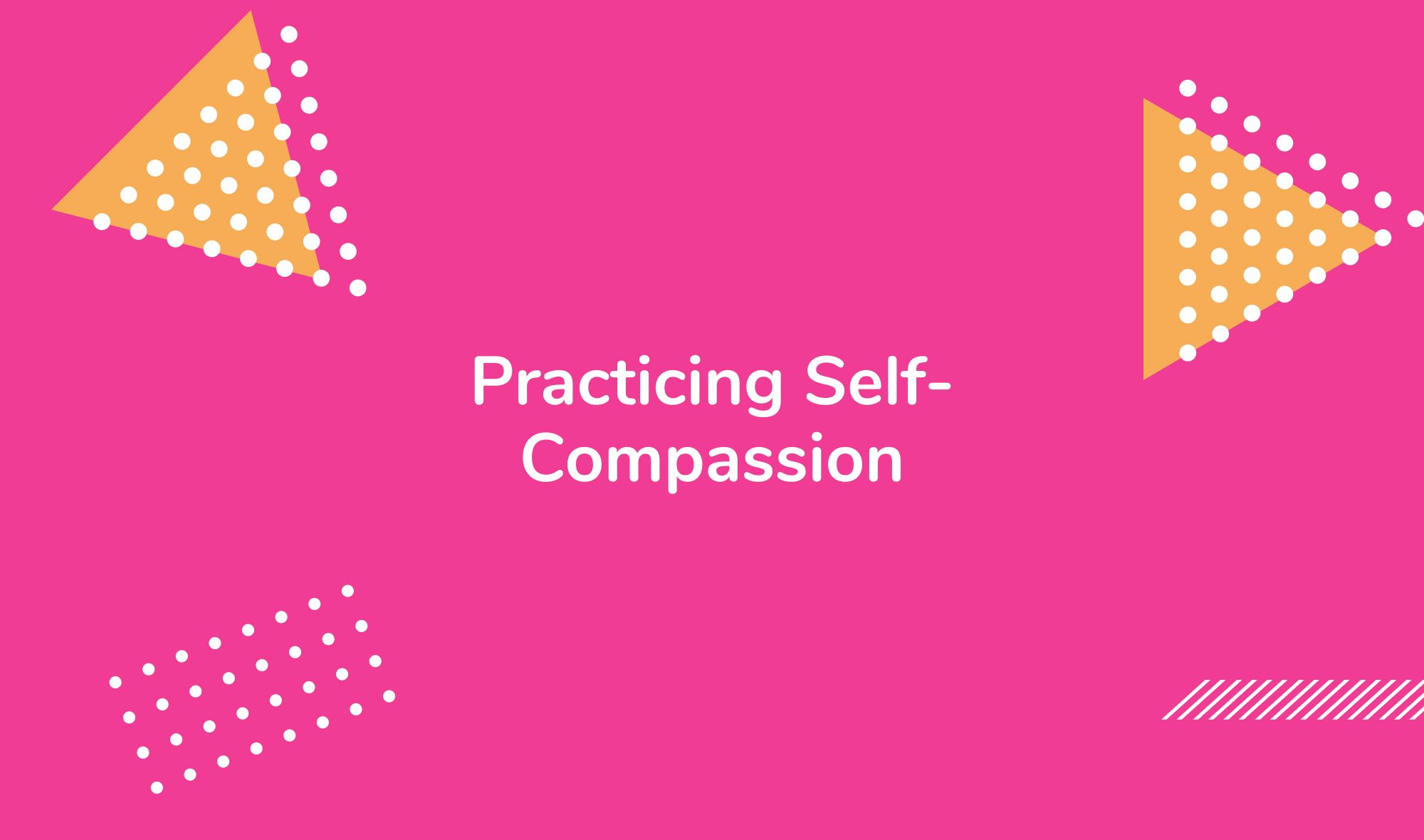
One key step in overcoming self-doubt is learning to treat yourself with the same kindness and understanding you'd extend to others. This concept, known as self-compassion, has proven to be an effective remedy for self-doubt and a catalyst for self-confidence.
The Importance of Self-Compassion in Overcoming Self-Doubt
Self-compassion involves being open to your own suffering, not avoiding it, and acknowledging it without judgement. When you embrace self-compassion, you recognize that everyone makes mistakes and experiences failure. This understanding can decrease self-doubt and promote a healthy sense of self-worth. Moreover, self-compassion encourages a growth mindset that views challenges as opportunities to learn and evolve.
Exercises to Practice Self-Compassion
- Mindful Self-Compassion Break: When you notice you're under stress, apply mindfulness to identify the feelings and thoughts associated with the situation. Then, remind yourself that suffering is a part of human experience. Finally, ask yourself what you need to hear or do to comfort and care for yourself at that moment.
- Writing a Self-Compassionate Letter: If you're struggling with self-critical thoughts, try writing a letter to yourself as if you were comforting a friend who was going through a similar situation.
- Developing a Self-Compassion Mantra: This is a set of phrases that you can turn to in challenging situations to help remind yourself to be self-compassionate.
One illuminating resource that dives deep into self-sabotage and offers powerful ways to transform it into self-mastery is the book "Mountain is You: Transforming Self-Sabotage Into Self-Mastery".
Furthermore, to better understand how a mentor or a coach can guide you in practicing self-compassion, take a look at our blog post on Coaching vs Mentoring.
Real Life Examples of People Who Overcame Self-Doubt

Witnessing others overcome their own self-doubt can serve as a powerful motivator for our own journey. Here are a few inspiring examples of people who struggled with self-doubt but eventually triumphed over it.
Albert Einstein
Believe it or not, Albert Einstein, one of the most brilliant minds in history, experienced severe self-doubt. He often doubted the worth of his work and feared he might be considered a fraud. But with persistence, he made groundbreaking discoveries in physics that revolutionized our understanding of the universe.
Lesson: Even if you are doubting your abilities, remember that it doesn't equate to a lack of potential or worth. Keep persevering through the doubts.
Oprah Winfrey
Oprah Winfrey faced extreme poverty, abuse, and self-doubt during her early years. Despite these adversities, she went on to build a media empire and become a globally recognized symbol of resilience and success.
Lesson: Your past or present circumstances don't define your future. Don't let self-doubt hinder you from pursuing your dreams.
J.K. Rowling
Before publishing the successful Harry Potter series, J.K. Rowling was a struggling single mother with a pile of rejections from various publishers. She overcame her self-doubt, continued to believe in her story, and eventually became one of the best-selling authors in history.
Lesson: Don't let the fear of rejection or failure stop you from trying. If you believe in something, pursue it with passion and resilience.
Creating an Environment Free of Self-Doubt
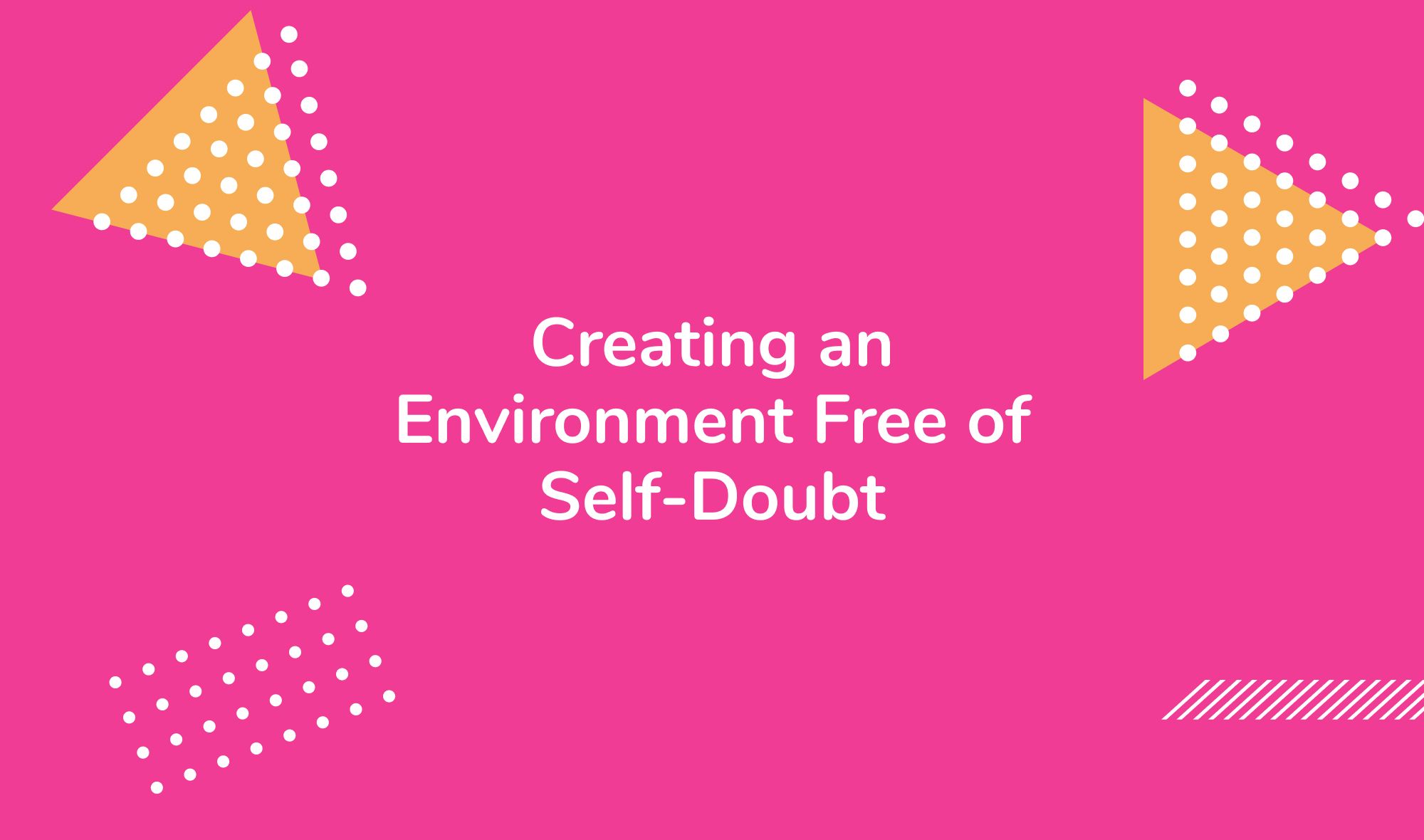
In the quest to conquer self-doubt, your surroundings play a crucial role. The environment you cultivate, both physically and socially, has a significant impact on your mindset and self-perception. Here's how to shape an environment that fosters confidence instead of self-doubt:
1. Surround Yourself with Supportive Peers and Mentors
A network of positive, supportive individuals can be a powerful antidote to self-doubt. These are the people who believe in your capabilities, even when you don't. They provide encouragement, cheer on your accomplishments, and help you stand back up when you fall. Seek out mentors who can provide guidance and share their own experiences with overcoming self-doubt. Their wisdom can prove invaluable in your journey.
2. Value Constructive Feedback
Constructive feedback is essential for personal growth and overcoming self-doubt. It helps identify areas of improvement, offering a more objective view of your performance than your self-doubting thoughts might allow. Embrace feedback as an opportunity to learn and improve, rather than as a critique of your worth.
3. Cultivate a Positive Workspace
Your physical environment also matters. A clean, organized workspace can foster clearer thinking and reduce feelings of overwhelm. Incorporating elements that make you feel positive - whether it's inspiring artwork, motivational quotes, or photos of loved ones - can also help combat self-doubt.
In our blog post on creating a Culture of Engagement, we dive deeper into how a supportive, engaging environment can foster confidence and growth, helping you banish self-doubt for good.
Conclusion: From Self-Doubt to Self-Confidence
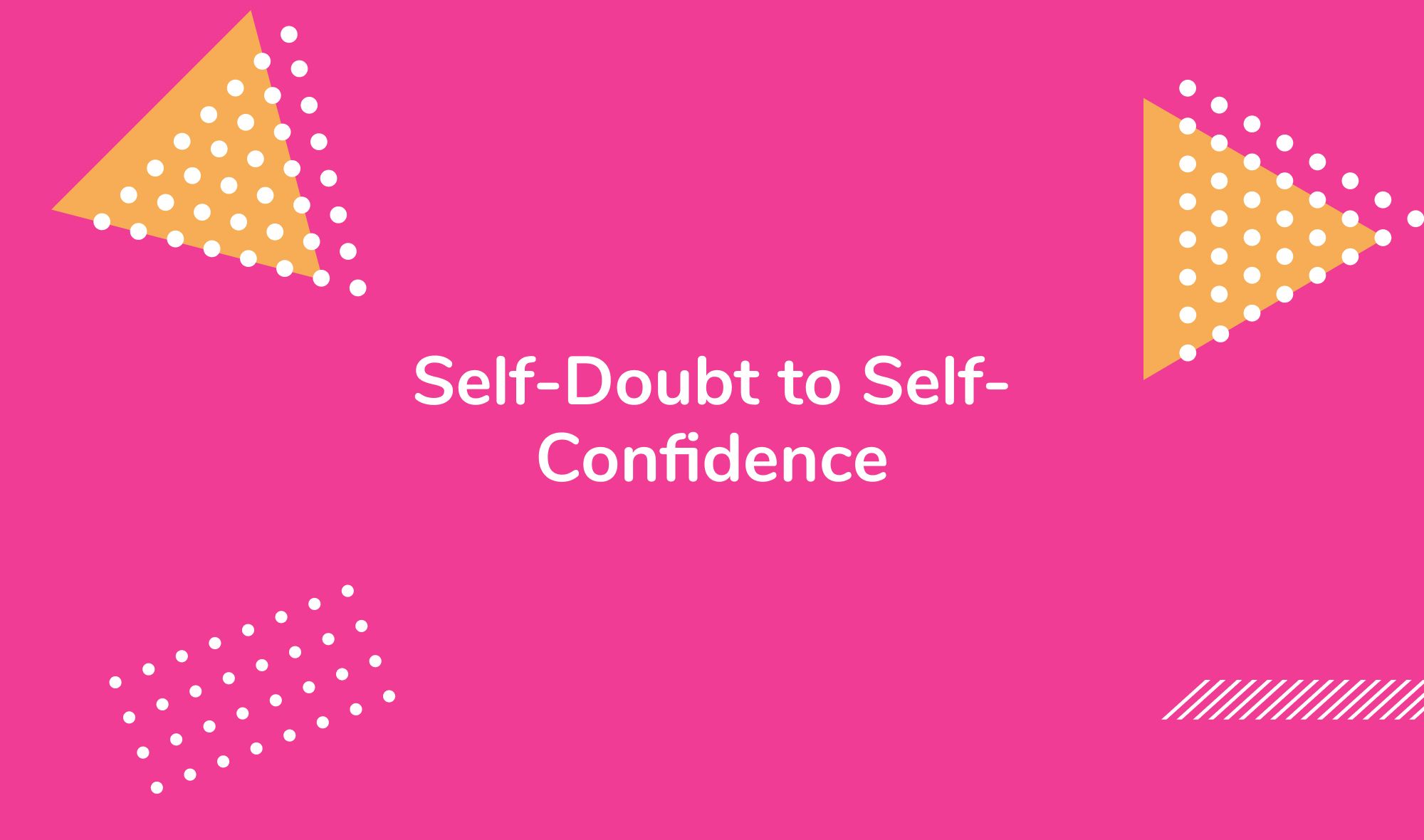
The journey from self-doubt to self-confidence may seem daunting, but it's a path well worth traveling. It's about more than just feeling better about yourself – it's about unlocking your full potential and living a more fulfilled, authentic life. To recap, the journey involves:
- Understanding the roots of self-doubt, including psychological factors and societal influences.
- Recognizing the negative effects of persistent self-doubt on your mental health and performance.
- Identifying signs of self-doubt and cultivating self-awareness.
- Building self-confidence through targeted steps and strategies.
- Harnessing the power of positive self-talk.
- Practicing self-compassion to alleviate feelings of self-doubt.
- Learning from the real-life examples of successful individuals who have overcome self-doubt.
- Creating a supportive, positive environment that fosters self-confidence.
These steps aren't just theoretical; they're practical and actionable. With time, practice, and patience, you can shift from self-doubt to self-confidence, opening up a world of opportunities.
So why wait? The journey to overcoming self-doubt begins today. Recognize your worth, believe in your abilities, and take the first step towards a future filled with confidence and accomplishment. You have the power to turn self-doubt into self-confidence – seize it!
Additional Resources
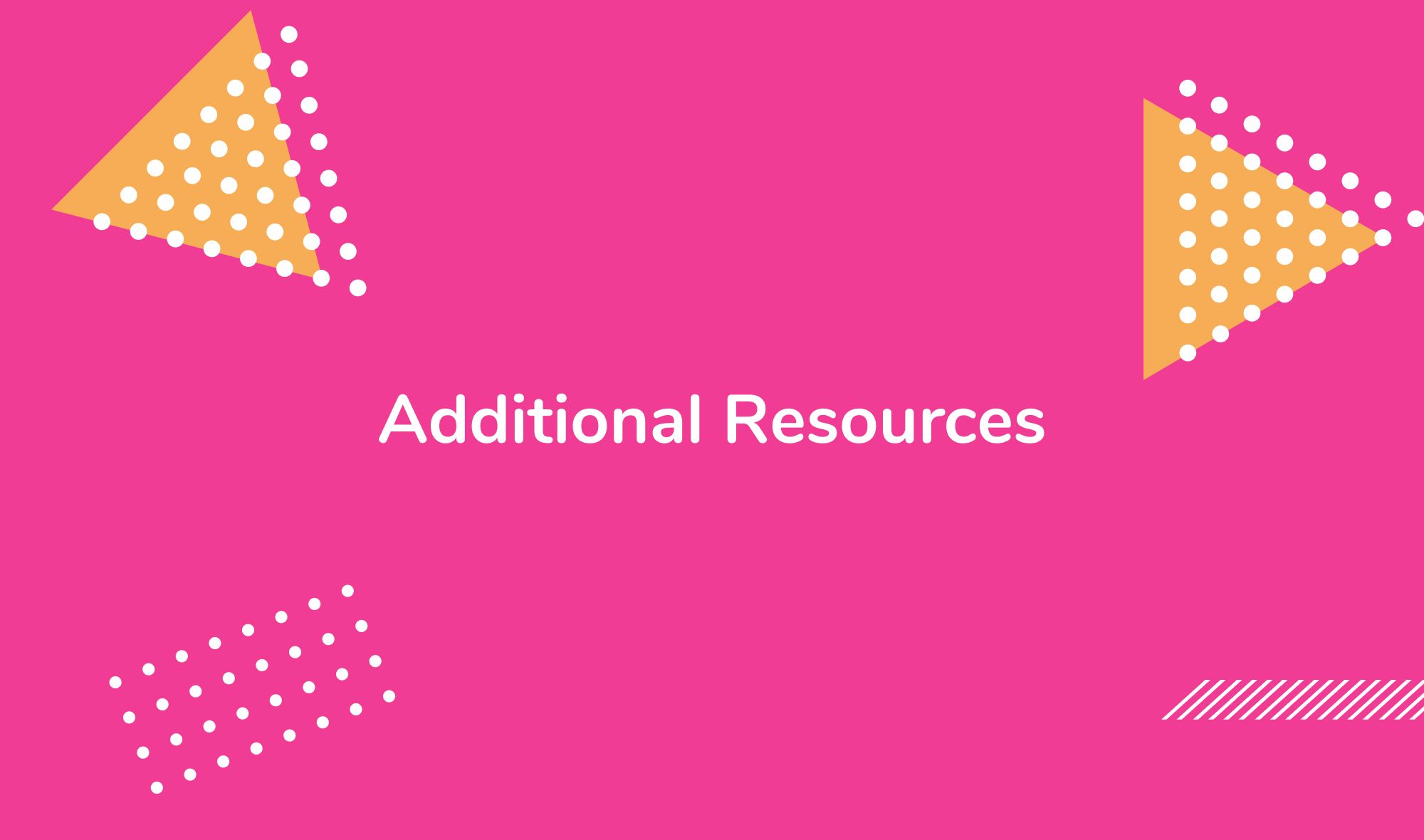
To continue your journey from self-doubt to self-confidence, consider exploring the following resources:
- Get Out of Your Own Way: Overcoming Self-Defeating Behavior: A powerful book by Mark Goulston and Philip Goldberg that provides insights and strategies to overcome self-defeating behaviors that often accompany self-doubt.
- Zella Life’s Business Coaching Services: Professional coaching can be a valuable tool in your journey to overcome self-doubt. The coaches at Zella Life can provide personalized guidance, strategies, and support to help you build self-confidence and reach your potential.
Keep in mind that overcoming self-doubt is a journey, not a destination. It's normal to experience self-doubt from time to time, but with these resources and strategies, you can learn to manage these feelings effectively and continue to grow in self-confidence.
Read more about: Imposter Syndrome
About Remy Meraz
Remy Meraz, co-founder, and CEO of Zella Life, is a visionary leader who leveraged corporate glass ceiling challenges as a woman of color to drive systemic change.
While leading and cultivating high-performance teams from VC-backed startups to Fortune 500, she consistently faced obstacles such as inadequate mentorship, lack of psychological safety, and non-personalized training. Taking matters into her own hands, she turned to executive coaching and NLP training. This life-changing growth experience led to breaking leadership barriers and a passion for cognitive psychology.
Motivated by her experiences, she co-founded Zella Life, an innovative AI-driven coaching platform bridging the talent development gap by enhancing soft skills and emotional intelligence (EQ) in the workplace.
Her vision with Zella Life is to transform professional development into an inclusive and impactful journey, focused on the distinct needs of both individuals and organizations. She aims to promote advancement and culture change by ensuring every professional's growth is acknowledged and supported.
Today, Remy is recognized as an influential innovator, trainer, mentor, and business leader. Under her leadership, Zella Life has delivered significant measurable outcomes for numerous well-known brands. This track record of positive outcomes garnered attention and funding from Google for Startups and Pledge LA, establishing Zella Life as a pivotal force in the learning and development arena tackling and resolving fundamental talent development issues for organizations of all sizes.